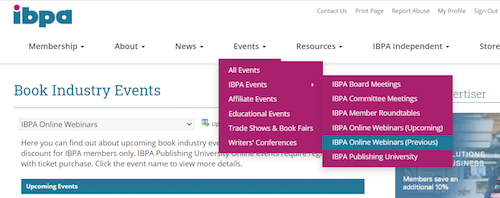PUBLISHED MARCH/APRIL 2021
by
Amanda Gawthorpe, Senior Editor, Blue Ink Press --

Amanda Gawthorpe
By adhering to professional publishing standards you can win a place on the shelves of independent bookstores.
On the surface, independent publishers and independent bookstores should be a match made in heaven. Both are the proverbial underdogs, trying to survive in an industry where corporate publishers and corporate bookstores alike win the majority of market share. But when it comes to approaching bookstores to stock independently published titles, indie publishers are often met with hesitancy or flat-out rejections. As a result, many small presses and author-publishers have given up on the dream of seeing their titles on bookstore shelves.
It may come as a surprise to learn that independent bookstores actually do want to work with author-publishers and small presses, but finding books that are up to industry standards is a challenge for them. “I have had some very good experiences with author-published books and indie presses over the years, so I’m always hoping to replicate those successes,” says Suzi Hough, the author consignment program manager at
Hicklebee’s Bookstore in San Jose, California. “However, the vast majority of author-published books I see are not up to industry standards in terms of production quality or content. But when you find a gem that’s well-produced and a good fit for your market, it’s wonderful.”
Laura Gibbons, owner of Hannibal, Missouri-based
Red Hen Bookshop, agrees. “There are so many people with great stories that unfortunately aren’t going to get the time of day from bigger publishers. Small and indie presses can be the champions for those stories, which can be very wonderful. I’ve read some great books from small presses by authors that I would read again and again.”
Why, then, aren’t independent bookstores more willing to give shelf space to author- and indie- published books? Sometimes, the answer is quality. “I can’t quite describe the specific tells, but I often know at a glance that the book’s author-published from the art on the cover,” Hough says. “There’s an unpolished quality, a visual style not quite in line with contemporary books from the big publishing houses. When it comes to text, it’s still alarming how many grammar and spelling errors make it to the published page.”
Booksellers want to promote local authors and small presses, but with low profit margins and sales that are undercut by large online retailers, most independent bookstores can’t afford to give space to a book that won’t move. “Remember, bookstores are there to sell books and make money,” Gibbons says. “If it won’t sell, I won’t carry it.”
To help indie publishers understand and adhere to industry norms and standards, in 2017, IBPA published its
Industry Checklist for a Professionally Published Book. The checklist covers all critical elements of a book, from legal compliance to editorial and design conventions and pricing norms.
Hough emphasizes that all areas of the checklist should be adhered to in order to give your book the best chance of securing a space on shelves. “The average children’s paperback book that we carry is $7.99. If an author-published children’s paperback is $15.99, we won’t be able to sell it,” she says. “If the book is printed on cheap paper or it doesn’t have a polished, professional cover with the title on the spine and an ISBN barcode on the back, we won’t be able to sell it.”
Independent bookstores and independent publishers have the same end goal: We all want to sell books. As publishers, it is our responsibility to produce professional quality books and align our positioning with the market so that booksellers will want to champion them. We only hurt ourselves when we don’t invest the time and resources to adhere to industry standards and practices.
Victoria Sutherland, publisher of
Foreword Reviews and an
IBPA board member, says it best. “The established players in the publishing trade have a long history of tradition and gatekeeping, which, in my experience, has made it difficult for newcomers to join the party. However, some of their reasons are quite valid, as many independent and author publishers do not follow basic standards of professionalism, including formatting, editing, and design. With so many millions of books being published each year, these standards help suss out the wheat from the chaff for readers and trade buyers.”
The IBPA Advocacy Committee seconds Victoria’s sentiment. “Don’t dishonor your project or your readers’ time by not putting your best foot forward in all aspects of the process.” In keeping with its mandate to advocate for access to all areas of the book trade, the IBPA Advocacy Committee sees adhering to industry standards as a critical way to combat bias against indie publishers, and implores all independent publishers to refer to the industry standards checklist when publishing their titles.
The barriers to entry are not as high or as fixed as we may believe. Independent publishers want to see their titles on shelves at indie bookstores. Independent booksellers want to stock good quality, saleable indie titles. And
Foreword Reviews wants to promote professionally published independent books. It’s up to us, the independent publishers, to exact the due diligence that will give our books the best shot at succeeding in the book trade. By adhering to professional publishing standards, author publishers, hybrid presses, and independent publishers alike can help level the playing field between themselves and large-scale publishing entities, and make progress toward one of their most important objectives: to win their place on the shelves of independent bookstores.
Want to learn more about professional standards and working with indie booksellers?
Go to
ibpa-online.org → Events tab → IBPA Events → IBPA Online Webinars (Previous) and look for:

Download the Industry Checklist for a Professionally Published Book here.
Amanda Gawthorpe is the senior editor at Blue Ink Press in Raleigh, North Carolina, and a member of the IBPA Advocacy Committee. She moonlights as a bookseller at an independent bookstore.